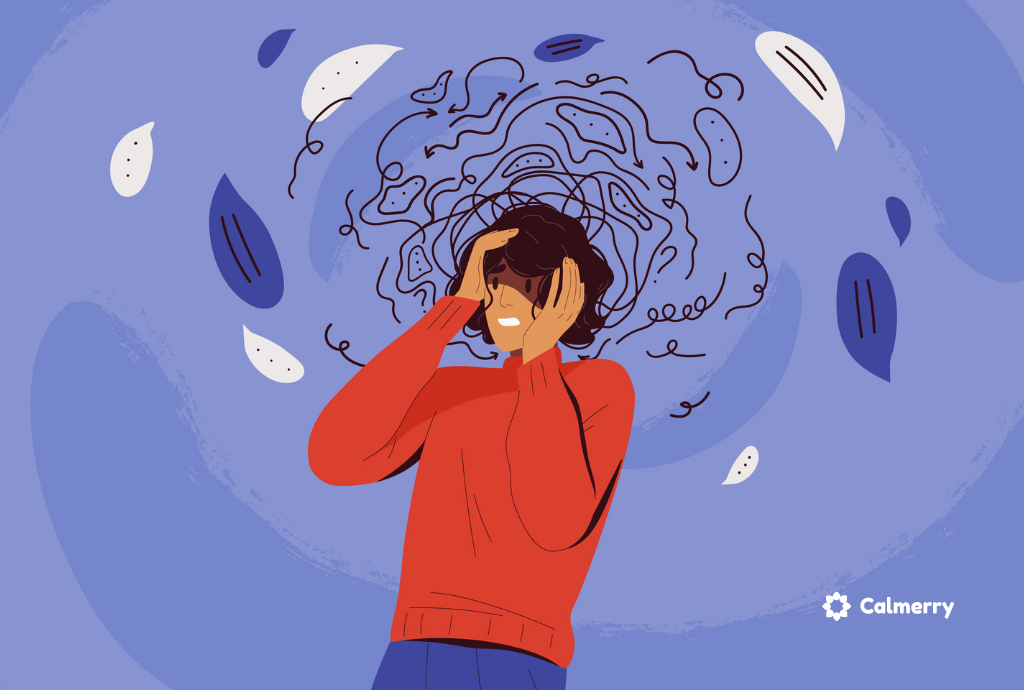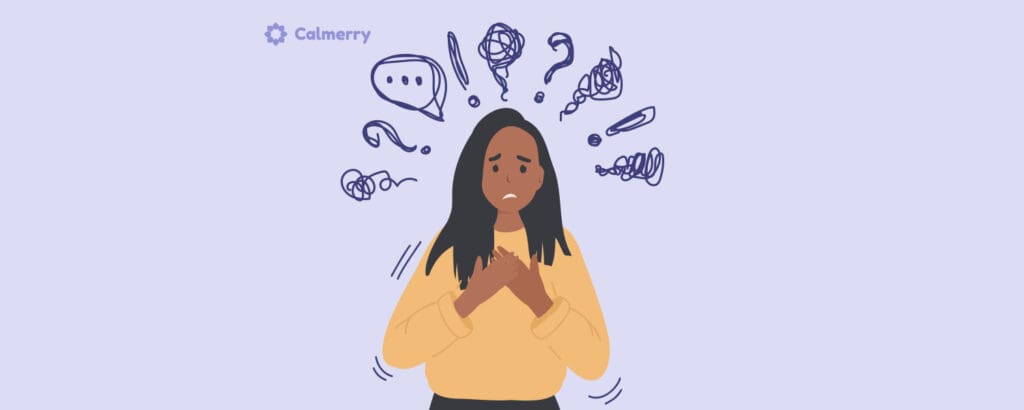Why Anxiety Can Cause Shortness of Breath & How to Treat it

In this article
Shortness of breath, also known as dyspnoea, is one of the most common reasons people visit the hospital or call an ambulance. It’s a very distressing experience and can be a warning sign of a physical illness.
However, shortness of breath is also often caused by mental health issues such as anxiety and panic disorders. And that’s what this article will focus on today: why anxiety can cause shortness of breath and how to overcome it.
We’ll explain how you can tell if anxiety is causing your shortness of breath, the best treatments and self-care tips, and how to stop shortness of breath in its tracks with diaphragmatic breathing.
Can anxiety cause shortness of breath?
Yes, anxiety can cause shortness of breath in some people. It’s considered a common symptom, but that doesn’t mean everyone with anxiety will experience it.
Many people do not realize that anxiety is the cause because it feels like a physical issue. Mental health issues like anxiety can cause physical symptoms as well as psychological ones.
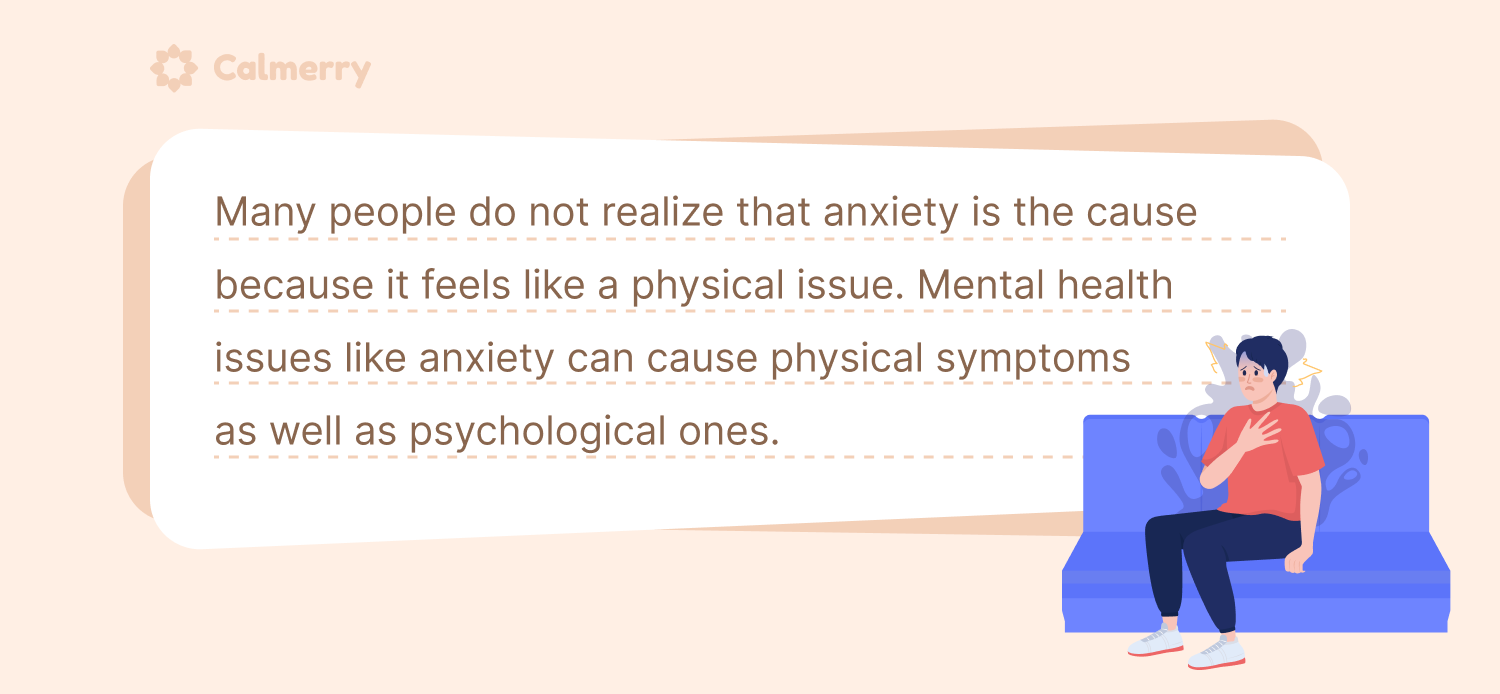
Anxiety-induced shortness of breath is most prevalent among people with panic disorder. It’s a type of anxiety where you experience regular panic attacks.
Panic attacks can bring on intense physical sensations, such as feeling faint and short of breath. They can be frightening and happen suddenly, but they’re not physiologically dangerous and usually pass within 5 to 20 minutes.
What does shortness of breath from anxiety feel like?
Some of the sensations you may experience include:
- A tightness or constriction in your chest that makes it feel difficult to take a full breath
- Rapid, shallow breathing where you feel you can’t get enough air
- A smothering or suffocating feeling
- The need to consciously think about breathing and make an effort to breathe
- Feeling breathless or winded even though you haven’t exerted yourself physically
- Dizziness, lightheadedness, or feeling faint from lack of oxygen
- Anxiety and panic exacerbating the shortness of breath even further
The shortness of breath from anxiety is not actually caused by a physical problem with your lungs or airways. Rather, it stems from your body’s fight-or-flight response kicking in when you experience anxiety.
This leads to rapid, shallow over-breathing known as hyperventilation. The imbalance of oxygen and carbon dioxide can trigger those uncomfortable respiratory sensations.
Why does anxiety cause shortness of breath?
When you feel anxious or panicked, it can trigger your body’s fight-or-flight response. It is an automatic physiological reaction that prepares your body to fight or flee a situation you perceive as scary or dangerous.
Fight or flight response causes an increased heart rate, higher blood pressure, and faster breathing. This increases oxygen levels and primes your muscles for action.
Faster breathing, also known as hyperventilation, and shortness of breath are closely connected. When you hyperventilate, you take smaller breaths, making you feel as if you are not getting enough air. In turn, this shortness of breath can trigger or worsen hyperventilation.
If you’re wondering, “can stress cause shortness of breath?” the answer is yes. Similar to anxiety or panic, stressful situations can trigger your fight or flight response.
Other causes of shortness of breath
Anxiety isn’t the only possible cause of shortness of breath. It may occur when you are exposed to changes in altitude, have a sedentary lifestyle, exercise, or wear tight clothing.
Shortness of breath is also linked to various health conditions such as:
- Asthma
- Chest infection
- Obesity
- Anaphylaxis (severe allergic reaction)
- Smoking
- COVID-19
- Lung cancer
- Chronic obstructive pulmonary disease
Many of these conditions are severe and potentially life-threatening. Therefore, you should seek medical help right away if you have shortness of breath and:
- Chest pain
- Struggling to get enough oxygen
- Feeling pain that spreads to your arms, back, jaw, and neck
- Experiencing a high fever with a cough and chills
- Have swollen ankles and feet
- It gets worse when you’re lying down
How to tell if shortness of breath is from anxiety
The best way to find out what is causing your shortness of breath is by consulting with a doctor or health professional. They can perform a medical evaluation to rule out other possible causes, such as any underlying physical health issue.
Having a diagnosis and knowing that anxiety is the cause can help you stay calm when shortness of breath arises and avoid catastrophic thinking.
Working with a health professional will also help you get treatment if needed and develop effective coping methods.
Learning to recognize the signs and symptoms of anxiety can also help. If you experience shortness of breath alongside any other anxiety symptoms, then you know there’s a good chance they’re linked.
Some common anxiety symptoms include:
- Feeling nervous, tense, or restless
- A sense of impending danger, panic, or doom
- Heart palpitations
- Trembling
- Sweating
- Feeling tired or weak
- Feeling dizzy or lightheaded
- Dry mouth or difficulty swallowing
- Tingling in extremities
- Difficulty concentrating
- Difficulty controlling your thoughts or thinking about anything else other than your worries
- Sleep issues
- Avoiding things that make you feel anxious
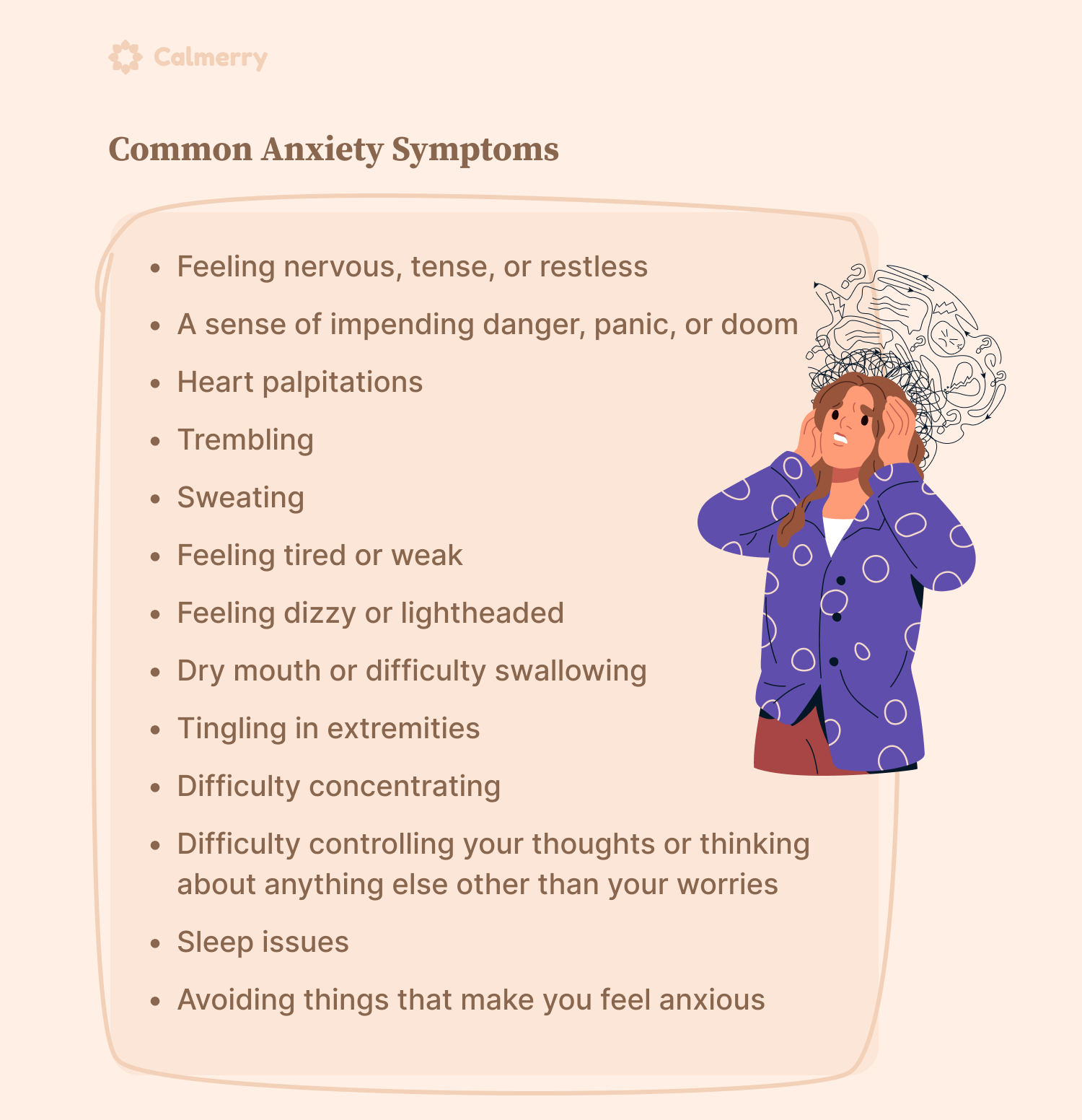
How do you get rid of shortness of breath from anxiety?
When you feel short of breath due to anxiety or a panic attack, there are some things you can do to help get it under control.
First off, try to gain some control by using your diaphragm to breathe. When we’re short of breath, we tend to inhale and exhale using our chest or mouth.
Here’s how to get rid of shortness of breath from anxiety with diaphragmatic breathing:
- Sit upright or lie flat on your back.
- Put one hand on your chest and one on your stomach.
- Breathe in through your nose slowly, so your abdomen expands.
- Then, breathe out gently through your nose or mouth with pursed lips.
- Repeat practicing these steps, focusing on moving your stomach out against your hand while keeping the hand on your chest as still as possible.
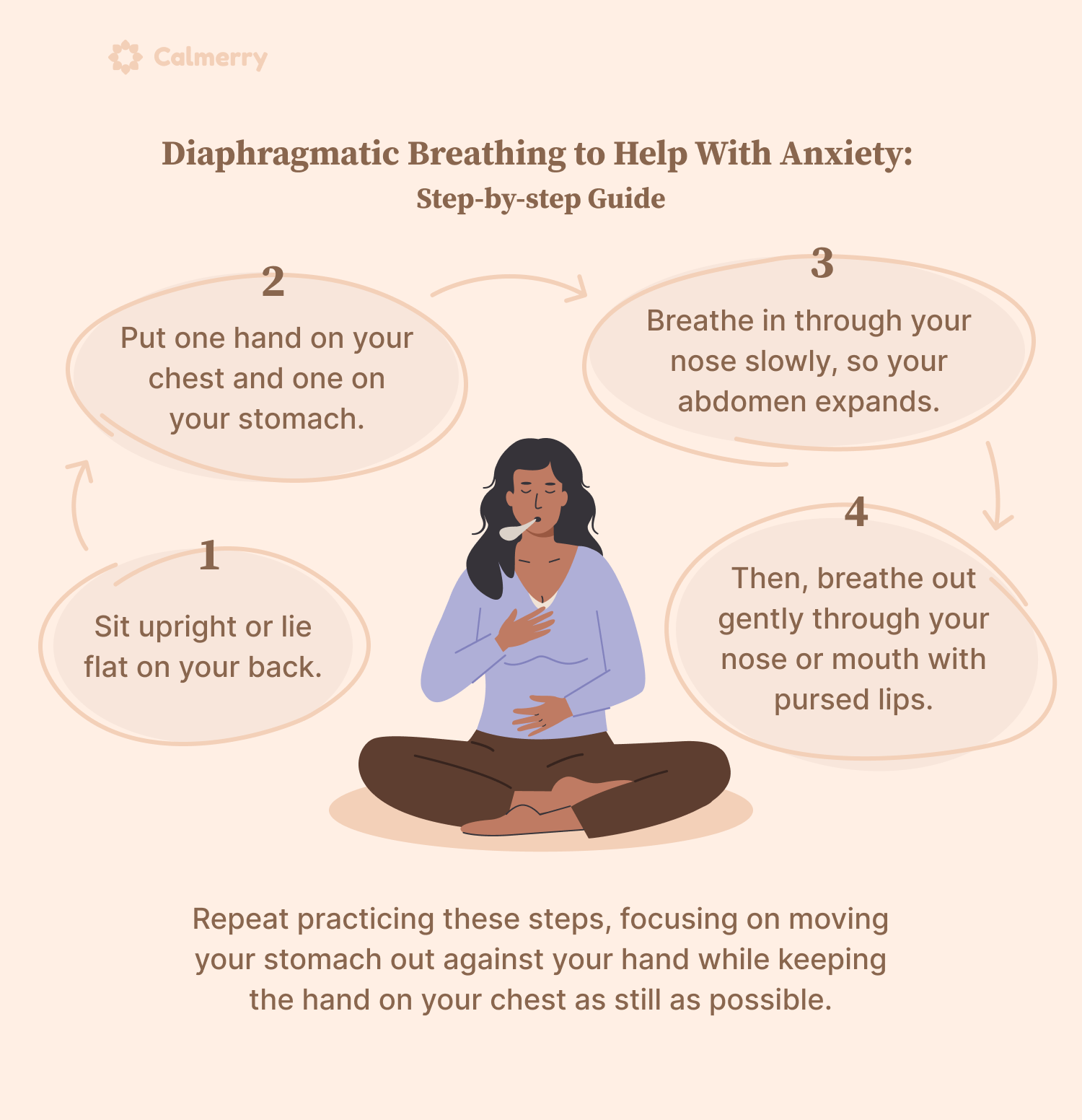
Diaphragmatic breathing helps to slow down your breathing, decreases oxygen demand, and requires less effort than other types of breathing. So, it’s much harder to hyperventilate or be short of breath, especially if you inhale and exhale through your nose.
Once you’ve got your breathing under control, you can also use the following techniques to relieve anxiety and panic attacks:
- Acknowledge that you’re having an anxiety or panic attack.
- Talk to yourself rationally and reassuringly, such as, “The doctor said I was physically healthy; these anxious feelings are temporary and will pass soon.”
- Distract yourself by focusing on an object, relaxing images, counting, or tensing and relaxing different body parts.
- Write down your thoughts and feelings.
Self-care tips for shortness of breath
The following self-care suggestions can help you keep shortness of breath at bay:
- Losing weight if you are overweight
- Quitting smoking
- Staying healthy by exercising, eating well, managing stress, and getting enough sleep
- Meditate or do mindfulness exercises to help reduce anxiety and stress
- Practice breathing with your diaphragm, so it becomes a habit
- Stick to your treatment plan for any underlying condition
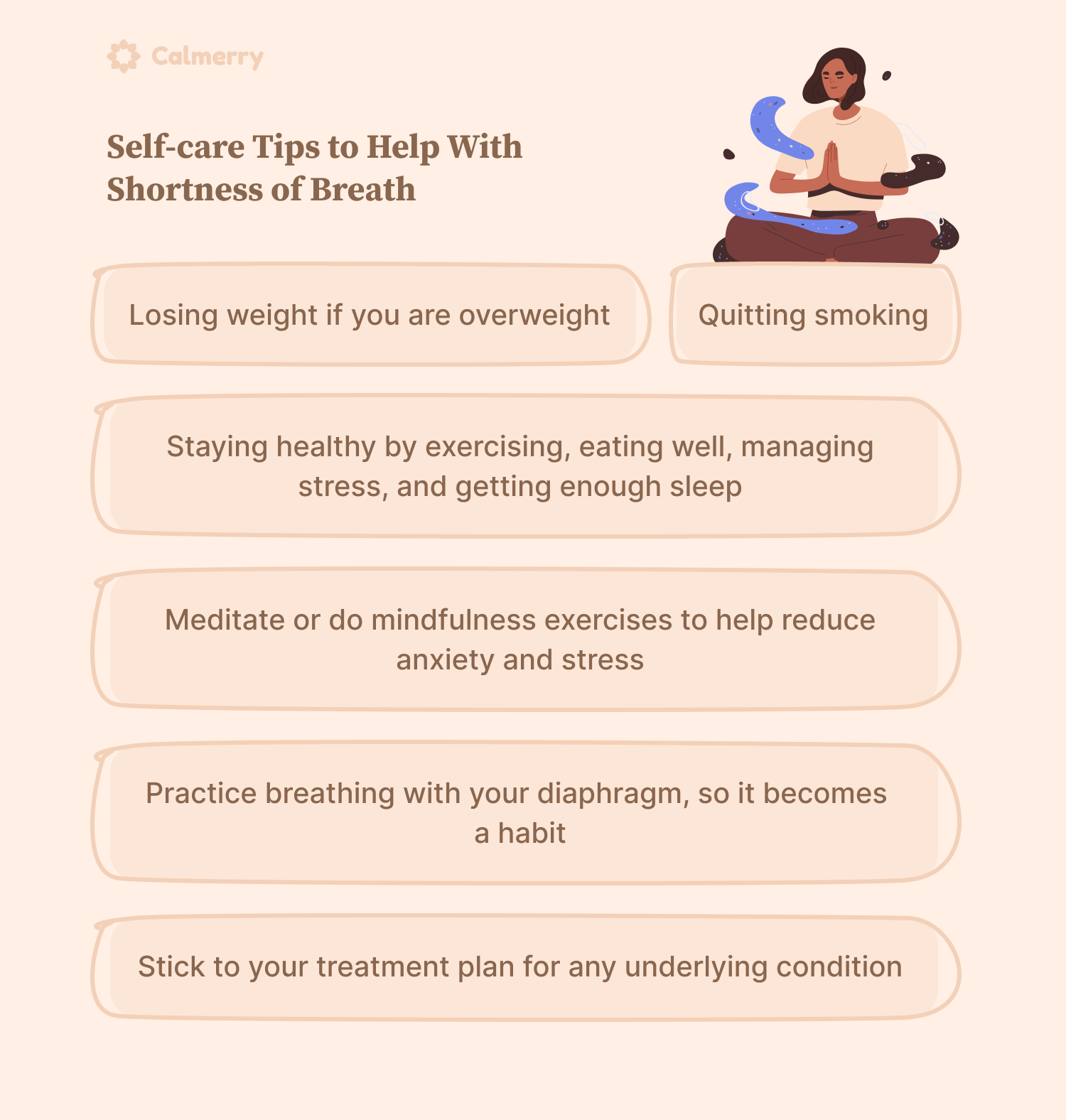
Treatments for anxiety and panic disorders
Various treatments are available for anxiety and panic disorders, including psychotherapy, medication, and relaxation techniques. These treatments can help reduce all kinds of anxiety symptoms, including physical symptoms such as shortness of breath.
Therapy for anxiety is often a highly effective approach, as it provides individuals with the tools to better understand and manage their anxiety triggers.
Treatment also involves learning practical techniques to manage anxiety and panic attacks when they occur.
Here are the main treatments for anxiety and panic disorders:
Cognitive behavioral therapy (CBT)
Often considered the “gold standard” of psychotherapy due to its effectiveness, CBT could help you overcome an anxiety disorder and learn to deal with shortness of breath.
It involves working with a therapist to identify negative thinking and behavioral patterns that contribute to your problems and then changing them for more constructive ones.
Calmerry therapists are trained and experienced to help you cope with anxiety. We can match you with the best-fit therapist within 1 hour.
Exposure therapy
This type of therapy involves being gradually exposed to situations that trigger your anxiety or shortness of breath to help desensitize you to them. A therapist will also offer guidance on effective coping techniques to use in these situations.
Exposure therapy is especially effective for people with phobias.
Relaxation techniques
A therapist will teach you relaxation methods you can use for immediate relief from anxiety or shortness of breath. These include diaphragmatic breathing, progressive muscle relaxation, guided imagery, and reassuring self-talk.
Medication
Sometimes, medication is used to relieve the symptoms of anxiety. Several types are available, and they’re often prescribed alongside other forms of therapy.
Medication may be given on a short or long-term basis, depending on your diagnosis and circumstances. Your doctor will recommend which medication could be right for you.
Conclusion
Anxiety and shortness of breath caused by anxiety can be very distressing. Learning how to use effective coping methods, such as diaphragmatic breathing, can help you keep it under control.
It’s important to check with your doctor first to rule out any other possible causes. Doing so can help put your mind at ease and keep panic at bay.
Working with a mental health professional is the most effective way to overcome any anxiety or panic disorders linked to your shortness of breath. If you’d like to speak to a professional, you can get matched with them within 1 hour here at Calmerry.
online therapy
live video session


